#is this analysis? i guess it is
Explore tagged Tumblr posts
Text
Little things I've noticed while watching Fionna and Cake episodes 9 and 10
(Potential spoilers and general ramblings)
• Shermy and Yumyulack share a VA :-D
• Betty was on the newspaper the squirrel ate in Fionna and Cake's world.
• Shermy Simon recieved guidance from Beth, the descendant of Jake the Dog, who is iconic for giving great advice.
• When hiding Casper and Nova's story, Betty knew exactly which book Shermy Simon was gonna grab at the library. I'd like to think she didn't have to rely on her omnipotence for that.
• GOLBetty is most DEFINITELY living in a non-linear timeline/doesn't abide to time at all. She uses concepts from the future to talk to Simon. She refers to her life with Simon as an "experience" as if it was just a moment in time
• Barely any Simon and Marcy :'-( Hopefully we get more of them if we get a season 2
• Simon turning away from Betty when he put on the crown. I may be overanalyzing the hell out of this but I SWEAR this must mean something about his guilt or his innermost intentions or SOMETHING
• The statue in Fionna and Cake world changing into GOLBetty (pretty obvious but it should be mentioned)
• The name GOLBetty becoming canon 😭
• Fionna and Cake finding magic in the world they already knew <3
• Little Destiny and Jay living in Fionna and Cake world doesn't cause issues? Is it because Jay is related to Finn? Idk maybe we'll see something about them if a season 2 comes out
• Simon gets therapy (real edition)
• SIMON LEARNING TO USE KAOMOJIS WHEN HE TEXTS FIONNA??? HOW CUTE HE'S SUCH A DAD
• Simon borrowed Astrid's motorcycle-thing in the finale montage. He was also showing her 90's stuff. Maybe they become friends
• ASTRID DRAWING CASPER AND NOVA IN HER SKETCHBOOK. THOSE ARE HER OCS. BETTY IS AN OC THIEF LMAOO
• Baby Finn and Peppermint Tank still being together hehehe
And now, something random I noticed while watching Adventure Time:
SEASON 1 MARCELINE AND WINTER KING HAVE THE EXACT SAME BOOTS!!! HIS ARE JUST BLUE!!!
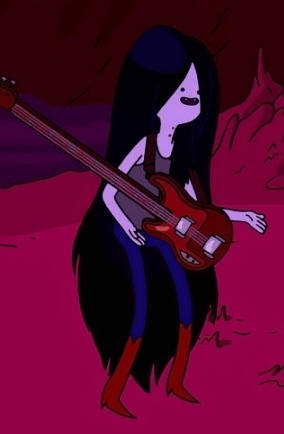
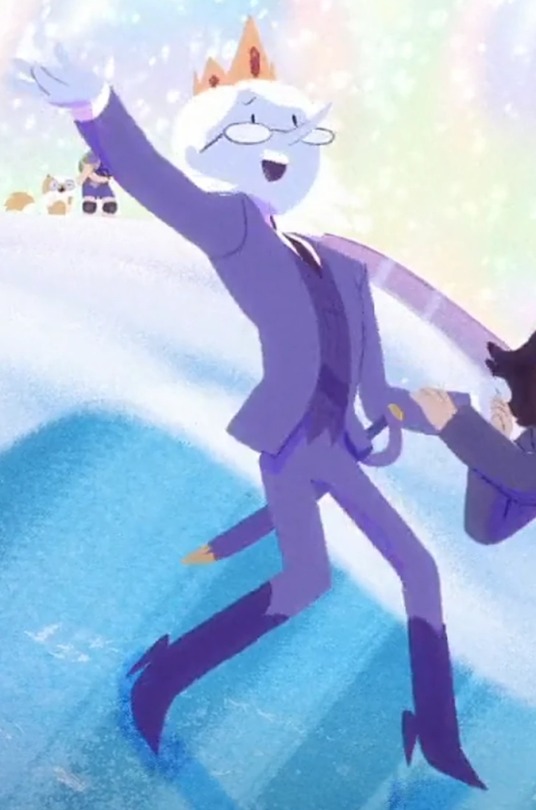
IS THIS A STYLE THING OR WHAT?? IDK I JUST THINK ITS NEAT
#fionna and cake finale#fionna and cake#fionna and cake spoilers#fionna and cake episode 9 and 10#simon petrikov#betty grof#golbetty#fionna mertens#cake the cat#fionna and cake analysis#is this analysis? i guess it is#background details#ramble
33 notes
·
View notes
Text
I think clone wars dark side anakin is my favorite dark side anakin. because yeah, in the movies, you can tell he's gonna fall. maybe not in the phantom menace, but in attack of the clones and revenge of the sith, it's so obvious! everything about him just oozes both light and dark, the dark steadily winning. but clone wars anakin? clone wars anakin? oh, he's a sun. he's blindingly bright and he's happy. we can go full episodes without a trace of the dark side showing up on his face or in his actions, which makes when he does go dark even more jarring. when he snaps and attacks and the imperial march plays faintly in the background, when not even ten minutes earlier in the episode he was joking around with ahsoka. that is peak dark side anakin to me, because that is what i imagine anakin truly was. happy and fun and then snapping, terrifying. it's why no one believed it when he fell. why obi-wan and padme and ahsoka didn't see it coming.
#star wars#anakin skywalker#ahsoka tano#obi wan kenobi#padme amidala#analysis i guess#the clone army#sw prequels
7K notes
·
View notes
Text
Guess who made even more of these stupid things
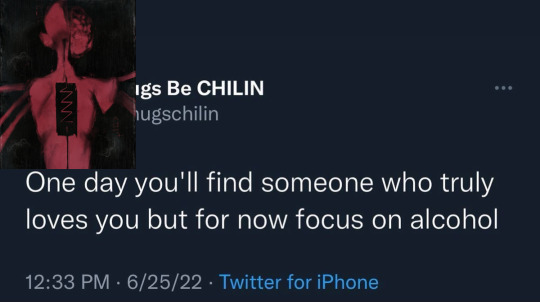






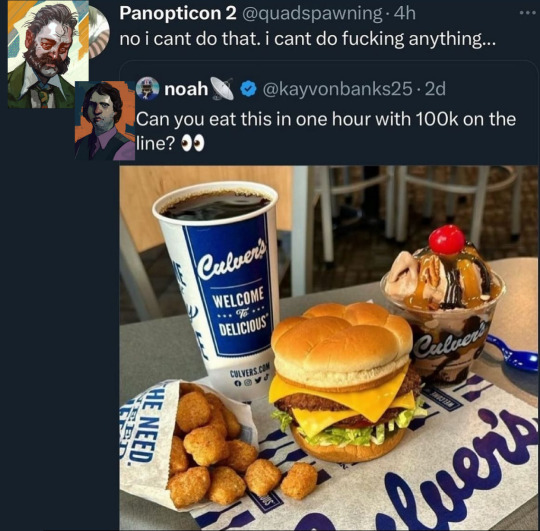


#it’s all I’m good at I guess#this and the occasional character/lore analysis#I’m not sure about some of these but whatever#I tried to include more variety but the same couple freaks kept applying#disco elysium#harry du bois#jean vicquemare#judit minot#kim kisturagi#trant heidelstam#steban the student communist#he has a tag???#lawrence garte#fuckass name#lawrence#klaasje amandou#cuno de ruyter#cunoesse#she has a last name I think but I don’t remember it#kimharry#does this count#I’ll tag it anyway#call me mañana
2K notes
·
View notes
Text
So like. Did anyone else notice that Jayce doesn't immediately shoot Viktor? He only powers his hammer on AFTER Viktor has opened his eyes. Below is Jayce's reaction to seeing Viktor (his Viktor, from his universe, not the future version of him) for the first time after walking into the dome. For the first time in months. That's like. A look of wonder. Almost reverence.

Assuming the Jinx/Rictus/Vander fight is cut to real-time after Jayce has gone into the dome, he's staring at Viktor for like. 5 minutes.

My interpretation here, of Jayce's expression just before Viktor finally opens his eyes to see Jayce in the room with him, he's committing Viktor to memory, before he has to kill him.
Edit: I almost missed it but like. HE IS SMILING For like 2 frames it's an outright smile. He leans in towards him, too. I cannot handle this.


#Arcane Spoilers#jayvik#arcane#arcane season 2#Jayce Talis#Viktor Arcane#arcane analysis#ok not quite 5 minutes but like 3 minutes#the first glance is like almost a smile? he wants to be happy to see him#He doesn't want to kill him#But he's seen the horrors this will lead to so he has to#And potentially Future!Vik is controlling him to some extent?#At least that's what this universe's Viktor sensed I guess with Jayce's interaction with Salo#But like. Let's be honest#Salo has a VERY punchable face#Jayce just got to whack-a-mole his ass#GOD every frame of this show is a work of art#It's so fucking good#Also not me finishing out the episode even though I was just looking for Jayvik screenshots#Because Isha's final sequence with her memories with Jinx is so heart-wrenchingly beautiful#I've seen it so many times but it never fails to make me cry#Nabexis thinks
1K notes
·
View notes
Text
A king is a poet who was forced to become a ruler with a heavy crown placed upon his head, yet stripped of his grace he becomes a soldier

a poet with a heart thrown to the world that refuses to become a soldier but is burdened with a sword becomes a king

#soldier poet king#jayvik#my analysis#they're both kings jayce is also a soldier and viktor is also a poet if u get me#i guess#jayce talis#viktor arcane#arcane season 2
1K notes
·
View notes
Text
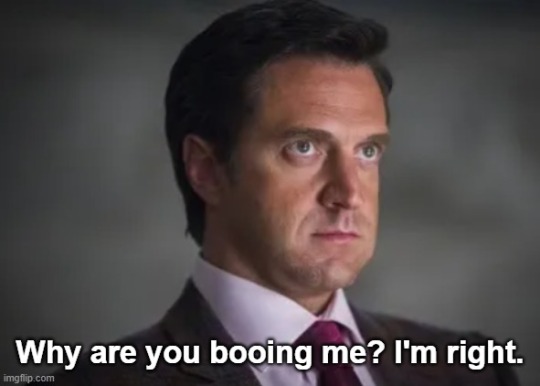
the "diagnosis" Chilton gave Will during his trial was the one closest to the truth ("Will Graham has never been diagnosed. He won't allow anyone to test him. He has carefully constructed a persona to hide his real nature from the world. He wears it so well, even Jack Crawford couldn't see past it. (...) There is not yet a name for whatever Will Graham is.")
unlike Alana Bloom or Jack Crawford, he saw what a manipulator Will was and that in front of them he played a poor, confused, wounded bird ("(...) A particularly-manipulative one at that. Poor, confused, wounded bird for Agent Crawford and Doctors Lecter and Bloom. And for me, well, I get the psychopath's triumvirate: charm, focus and ruthlessness. The charm, of course, being debateable.")
he believed Will that Hannibal may be the Chesapeake Ripper and said Jack Crawford: "Hannibal once served me tongue and made a joke about eating mine. It's hard not to at least consider it.". Jack ignored him. (I think Jack was already planning some large-scale action against Hannibal, but that's a topic for another post)
he called Dr Lecter "Hannibal the Cannibal"
he understood that Will Graham was alive because Hannibal Lecter liked him that way
criticized Jack for letting Will and Hannibal get closer to each other and then leaving Will alone ("You dangle Will Graham and now you cut bait. You are letting Hannibal have him hook, line and sinker.")
when Jack expressed hope that the relationship between Hannibal and Will was one of those friendships that ends after the disemboweling, Chilton told him: "I would argue, with these two, that's tantamount to flirtation. Will is going to lead you right to him." and let's be real, he was right.
#hannibal#nbc hannibal#hannibal nbc#will graham#hannibal lecter#hannigram#murder husbands#jack crawford#frederick chilton#my dumb-dumb babygirl is actually always right#i love him#hannibal meme#hannibal memes#hannibal shitpost#hannibal crack#hannibal meta#hannibal analysis#i guess#character meta#character analysis#frederick chilton meta#frederick chilton analysis#pesky--dust crack#pesky dust thoughts#pesky--dust analysis
6K notes
·
View notes
Text
Why I Love Caitlyn, and Why You Hate Her
⚠️ READER DISCRETION: I am not condoning Caitlyn’s actions and behavior, I am simply exploring the depth of her character and explaining what motivated her pursuit of revenge.

There’s no denying the gravity of Caitlyn’s actions as they are unquestionably wrong. However, her character cannot be reduced to these actions alone. This sudden, devastating behavior of hers is shaped by a thread of complex motivations and circumstances, but many choose not to acknowledge this simply because of her elite background.
Like many others, I initially overlooked the point of the gassing in Zaun, which I think is a crucial thing everyone must first understand before diving into the discourse over Caitlyn's character.
The Grey, often misunderstood as being used indiscriminately, was strategically deployed against the Chem-Barons to limit collateral damage. Caitlyn chose precision over chaos, targeting those directly responsible for Zaun’s turmoil. Furthermore, Caitlyn didn’t kill the Chem-Barons; she captured them, with net-deploying bullets. While her methods are controversial, they reflect a calculated approach; mischaracterizing her raid as a reckless attack ignores these details.
This isn’t to deny or excuse the fact that Caitlyn did, indeed, gas Zaun. Who’s to say that gas didn’t seep into the streets where innocent Zaunites roamed, harming them in the process? It’s entirely possible that innocents were affected and devastated. However, my brief explanation is only added to gain better perspective over the objectives of the gassing itself.
Now moving on, despite her privileged upbringing, Caitlyn shows a genuine effort to understand and connect with Zaunites. She places her trust in Vi, a Zaunite she’s never met before, to guide her in her search for Silco. Her journey through the undercity opens her eyes to the struggles of its people, challenging her perspective.
In S1E4, when investigating the airship attack, she encounters an undercity resident and reassures him, “I can protect you.” Later in the season, when Vi gets stabbed, Caitlyn encounters someone formerly connected to Vi. He’s grown a distaste over himself due to his appearance, and yet Caitlyn embraces him with compassion and tenderness, as a silent sign of gratitude. Then, she surrenders her cherished firearm—her only means of protection—in return for a healing potion to save Vi. In S1E7, Caitlyn’s heartfelt monologue in her conversation with Ekko perfectly captures her hope and determination: “This city needs healing. More than I ever realized. Please, let me help you.”
When Caitlyn and Vi stand in front of the Council, Caitlyn declares: “Councilors, this is Vi. She was born in the undercity. Even though we failed her in countless ways, she risked everything to show me what life is really like down there. People are starving, sick, ravaged by Shimmer. They live in constant fear of the coordinated efforts of violent crime lords.” This monologue alone shows how Caitlyn embodies optimism, believing in the inherent goodness of people, even Zaunites. It also shows that she is very willing to fight for them; she sees helping Zaunites as an act of bringing justice and equality into this world.

Many overlook the depth of Cassandra and Caitlyn’s relationship, reducing it to a simple narrative of a daughter mourning her mother. However, Caitlyn’s mourning is more layered than that. Throughout her life, she has been rebellious, driven by a desire to uncover the reality her mother tried to shield her from. In S1E4, Caitlyn reflects on this by saying, “She’d do anything to keep me from seeing the real world.” Caitlyn’s defiance wasn’t just rebellion for its own sake—it was a stand for her ideals. She sought enlightenment and understanding, even if it meant stepping outside the privileged bubble her mother built for her. By venturing into the undercity and aligning herself with Vi, Caitlyn rejected her mother's own ideals.
Here's another scene in S1E8 that emphasizes this:
Cassandra: You're a Councilor's daughter. Your actions reflect on the entire body. Caitlyn: My actions? You know what else reflects on the Council? Its citizens living on the streets. Being poisoned. Having to chose between a kingpin who wants to exploit them and a government who doesn't give a shit!
In a way, her actions mirror Vi’s: just as Vi betrayed her people by working with the enforcers, Caitlyn betrayed her own mother by involving herself with Zaunites. Remember: The last time we see Caitlyn and Cassandra interact on-screen is during Caitlyn’s plea before the Council. And in that moment, Caitlyn was fighting to protect the very kind that would soon kill her own mother.
You say that Caitlyn’s drastic shift is unjustified, as she’s only experienced a fraction of the suffering Zaunites have been enduring. But that’s precisely the point! Her transformation shows how personal loss can drive the change of one’s entire character; she’s never experienced loss before which is why it feels so heavy for her. And unlike Zaunites, Caitlyn actually has the power to act on her grief. Zaunites have only known misery their whole lives. When their loved one dies, they know there is nothing more they can do but grieve. They don’t have an inch of the privilege and military support Caitlyn has. If you had given them the same resources as Caitlyn, they wouldn’t hesitate to bring ruin to Piltover. Simply put, they don’t fight Piltovans because they don’t want to, but because they can’t.
When Jinx takes her mother away, her compassionate ideals completely shatter. Having always sought justice and understanding for Zaun, Caitlyn feels deeply betrayed, as her faith in the good within every Zaunite is overturned. Her mother’s death becomes a turning point—driving her to abandon her ideals and adopt Piltover’s disdain for the undercity, finally understanding the resentment many Piltovans harbor.

We also tend to forget that, aside from losing her mother, Caitlyn has directly suffered under the hands of Jinx. Caitlyn was held captive by Jinx in Season 1—and God knows what was done to her during that period. In the tea party scene, we see Caitlyn break down in tears, visibly flinching when Jinx moves toward her. It’s clear that Jinx has traumatized Caitlyn not just once, but twice. These experiences deeply shape Caitlyn’s actions moving forward. The pain and fear she’s endured push her to a place where she’s willing to sacrifice almost anything, even if it means putting a child’s life at risk (Isha's) or severing ties with Vi.
While they share their differences, Caitlyn and Jinx are the perfect example of foil characters. Here’s an instance which proves this: Both allow themselves to be influenced by manipulative, powerful figures all while being in a vulnerable state of mind.
Jinx is haunted by guilt; her attempt to save her family only ended up killing them, leaving her with the crushing weight of self-blame. She clings to Silco, not because he was the father she needed, but because he was the father she wanted. Silco indulged her destructive tendencies, keeping her at an all-time high on the edges of chaos. Fragile and broken, Powder crossed paths with Silco at the right moment; he saw the perfect chance to mold her into someone bewildered, unrestrained, and astray.

Caitlyn has her own Silco: Ambessa, the ruthless Noxian leader with a brutal philosophy of war. Ambessa enters Caitlyn’s life at a pivotal moment, stepping in just as Caitlyn is grappling with the devastating loss of her mother. In a spiral of self-identity, Caitlyn struggles with the weight of Piltover’s expectations and her unresolved guilt over her strained relationship with her mother (as explained in previous paragraphs). Just as young Powder mourns her family, Caitlyn blames herself for the death of her mother. Caitlyn got herself involved with the Zaunites even when she was warned not to, and at the expense of her defiance came the death of her mother. Driven by guilt and a thirst for vengeance, Caitlyn steps fully into her role, declaring in S2E1: “I am a decorated officer. Leader of House Kiramman.”
Jinx and Caitlyn share a tragic parallel: they both lose everyone they hold dear. Jinx loses Vi, Vander, Claggor, and Mylo. Caitlyn is left without Cassandra, Vi, Jayce, Mel, and Tobias. Stripped of their support systems, they are left isolated, with no one to confide in or rely on. They become vulnerable, used as pawns in the larger schemes of Silco and Ambessa’s strategic games.

Caitlyn's inner turmoil is exactly why Ambessa’s manipulation is so effective. Caitlyn is compelled to take revenge, but she doesn’t know how to. And without anyone else to guide her, she places her complete trust in Ambessa's expertise. Ambessa doesn’t just give Caitlyn the authority and power to avenge her mother; she teaches her how to use them to their full potential. She toys with Caitlyn's vulnerability, making her adopt the Noxian values of wrath, bloodshed, and ruthlessness.
It’s easy to downplay Caitlyn’s grief since she comes from an elite upbringing. While Cassandra Kiramman is laid to rest in a golden casket with a proper burial, countless innocents in Zaun become victims of merciless violence, being left to die on the streets. After the timeskip however, Caitlyn is shown to recognize the moral cost of her actions. Though the series portrays this realization subtly, it becomes evident that Caitlyn is grappling with the inhumanity and immorality of her pursuit of revenge. In S2E4, this internal conflict comes to light during her conversation with Ambessa. When Ambessa attempts to stoke her fury again, Caitlyn disarms her with a piercing question: “Why is peace always the justification for violence?”
Here's another scene that subtly depicts her realization and remorse:
Caitlyn: You're a monster. Why? Why do all this? Singed: Why does anyone commit acts others deem unspeakable? ... For love.
When Caitlyn steps further and sees Orianna, she realizes that Singed's revenge is a reflection of her own: a person grieving the death of their family member. Here, there's a saddened glint in her eyes. She finally understands now, that love and grief made her do things that once seemed so foreign to her. In this case, going against her own principles just to succeed in her revenge.
Caitlyn is now forever haunted by the outcome of her mistakes, but she knows her past cannot be erased. During her confrontation with Jinx in the prison, she admits, “No amount of good deeds can undo our crimes.” While this statement is directed at Jinx, it feels like Caitlyn also holds this against herself for her own wrongdoings.

Caitlyn’s acts of atonement are done quietly. She’s not good with words; she’s bad at articulating how she feels. Ironically, Vi is much better than Caitlyn when it comes to confronting and vocalizing internal conflict. So instead, Caitlyn’s actions speak for herself. By removing the guards at the prison, she tacitly allows Vi the opportunity to rescue Jinx. She knows Vi will come to save her sister, and yet she lets her. She finally lets go of Jinx and the grudge she held against her, as a silent act of her love for Vi.
And in S2E9, Sevika is shown to be sitting among the Councilors. But thanks to a fan's keen eyes, we find out that she is sat particularly on Cassandra Kiramman's chair (which not many notice). By allowing a Zaunite to occupy her mother's seat, Caitlyn gives them a chance to be rightfully represented, a chance for their voices and suffering to finally be heard. It’s a quiet display of Caitlyn’s evolution and willingness to bridge the divide between Piltover and Zaun.
That said, Arcane’s ending left much to be desired regarding Caitlyn’s arc. The heavy focus on Hextech overshadowed the sociopolitical dynamics of Piltover and Zaun. This is the main reason a lot of hate is thrown toward Caitlyn—there is an act of accountability, but there a lack of consequence. While Caitlyn acknowledges her mistakes, her privileged status keeps her from real repercussions, unlike the tragedy other characters had to face. This is frustrating, even to me, as someone whose favorite character is Caitlyn. Yet, in a way, it realistically portrays the inequalities in our own world—where the elite are often shielded from justice, and repentance is the closest they ever come to redemption.
#arcane#caitlyn kiramman#character analysis#league of legends#caitlyn#essay#in this essay i will#food for thought#i guess we really are a league of legends#caitvi#violyn#arcane vi#season 2 spoilers
1K notes
·
View notes
Text
“you never would you coward. (would you…?)”
the master getting teary eyed and scared when he realises the doctor is really considering to pull the trigger but still daring him to do it. He needs to know, he needs to see if the doctor is capable of it. is he? would he really? why is he still pointing the gun at him?
“go on then. do it.”
But he doesn’t want to die. you can hear it in his voice and see it in his face but he needs to know how far the doctor is willing to go. And besides he’s the master. He’s not gonna back down and plead. At least not in this regeneration. the subtle and terrorised headshake after works very well as there’s one part of the script missing in this scene

“don’t.”
and the doctor won’t.
#ahah. im normal.#you need to know this was the scene that made me look for the name of the ship#I already liked thoschei but not at the level to look for fanworks yet this was a gamechanger#I should analyse thoschei scenes more often instead of keeping it all in my head#scene analysis#I guess#does this count as#character analysis#idk#tensimm#thoschei#doctor who#the master#best enemies#simm master#the end of time#doctor/master#me being annoying about the master tag
597 notes
·
View notes
Text
I find it interesting that in fanon Elizabeth Bennet is widely held up as an avid bookworm when, in fact, there isn't a great deal of textual evidence to support that particular headcanon.
Perhaps it's because Mr Darcy comments on her reading at Netherfield or thanks to certain adaptations, but I frequently see her depicted as a voracious reader when we have the benefit of her view of her relationship to books from Elizabeth herself:
'“I deserve neither such praise nor such censure,” cried Elizabeth; “I am not a great reader, and I have pleasure in many things.”'
This is supported by the text as when Elizabeth reads in Chapter 8, it's only when she briefly ventures downstairs after attending to Jane for much of the day because Jane has finally fallen asleep. She picks up a book because the rest of the party are playing cards and, she suspects, gambling on the outcome:
'On entering the drawing-room she found the whole party at loo, and was immediately invited to join them; but suspecting them to be playing high she declined it, and making her sister the excuse, said she would amuse herself for the short time she could stay below, with a book.'
The fact that Elizabeth reads as almost a last resort makes Darcy's infamous 'improvement of her mind by extensive reading,' line all the funnier as it's further proof that he really doesn't know her and was only looking for superficial commonalities, rather than getting to know her on a deeper level.
There is one other time where she possibly reads, towards the end of Chapter 12, when she is briefly alone with Darcy. While he reads, there is no indication that Elizabeth does too:
'Steady to his purpose, he scarcely spoke ten words to her through the whole of Saturday, and though they were at one time left by themselves for half-an-hour, he adhered most conscientiously to his book, and would not even look at her.'
Actually, there are far more instances of Elizabeth picking up some needlework and sewing which perhaps point to that being her preferred method of passing the time...
In Chapter 10, when Caroline gives a running commentary on Mr Darcy writing a letter:
'Elizabeth took up some needlework, and was sufficiently amused in attending to what passed between Darcy and his companion.'
In Chapter 11, when Jane ventures downstairs and Bingley is fussing over her:
'Elizabeth, at work in the opposite corner, saw it all with great delight.'
In Chapter 59, after Mr Darcy returns from speaking to Mr Bennet to seek his consent:
'In a few minutes he approached the table where she was sitting with Kitty; and, while pretending to admire her work said in a whisper, “Go to your father, he wants you in the library.”'
In my opinion, I think most of us that adore Pride and Prejudice are likely bookworms ourselves and want to have something in common with a heroine we adore. It's far nicer to think of yourself as an Elizabeth Bennet than a Mary Bennet... though perhaps, unfortunately, such a sentiment is not supported by the text...
#pride and prejudice#jane austen#elizabeth bennet#mr darcy#mary bennet#classic lit#my analysis#fanon vs canon#we all want to be more like elizabeth bennet and I GET IT i really do#but she isn't a geeky little bookworm and i do think that's important for her character. like that's MARY#and also because it proves how little darcy knew her#he seems to be the bookworm of the pair and i guess was just looking for quite superficial things they had in common as i said#what seems like a compliment from him initially actually doesn't hold up to scrutiny#abysmal man
434 notes
·
View notes
Text
This episode really highlighted how close Marcille, Laios, and Chilchuck actually are.
The viewer is used to seeing our main characters behave like coworkers up to this point—even friends—and they express normal, understandable levels of concern and fear when their other party members are in danger. But when the nightmare attacked Marcille, it brought out sides of Laios and Chilchuck that the viewer hadn’t seen before.
Laios immediately notices when something is wrong with Marcille, and he tells the others as soon as he’s sure of the problem. Chilchuck and Senshi then follow Laios’ lead as it becomes clear that he intends to make her get some rest.
We see Chilchuck’s hands lay out the bedroll and Senshi’s hands set up the pillow, working in almost perfect tandem as Laios physically wrangles Marcille into bed.
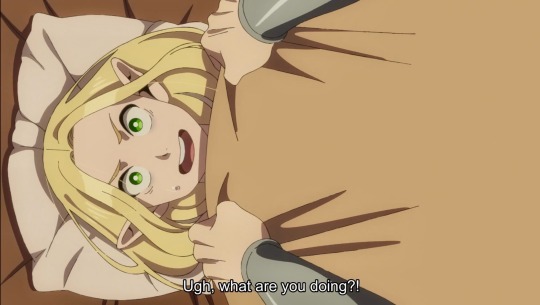
Senshi is in a similar perspective as the viewer, and mostly sits and watches the ordeal unfold. He doesn’t have a shared history, like these three do, so he helps in little ways, but mostly waits on standby for direction.
From here on out, it’s mostly Laios and Chilchuck who take over in planning how to help her.
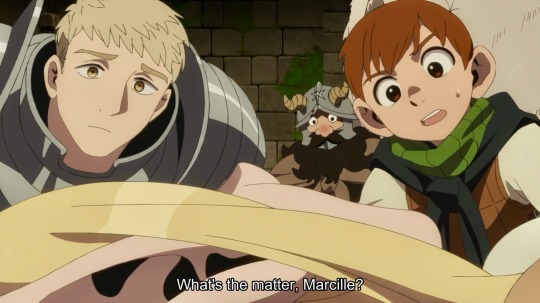
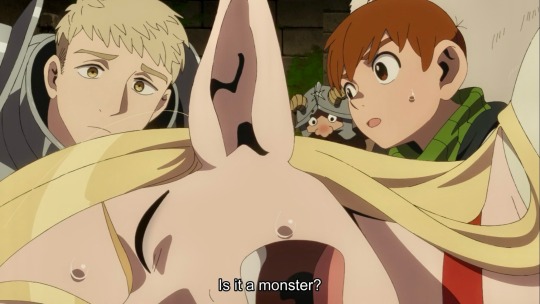
It’s uncommon for Chilchuck to openly show such distress and worry for one of his party members. He’s used to Marcille being able to defend herself; he’s used to her being capable and strong. He immediately defers to Laios for instruction, (rightly) assuming he will know what to do.
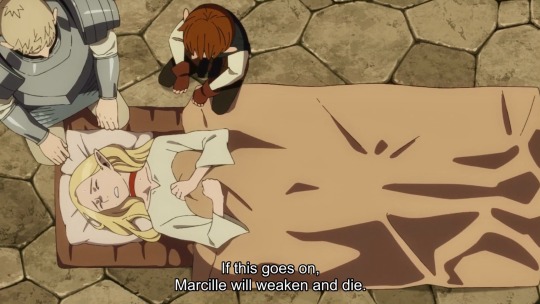
This actually produces a reaction close to real fear from Chilchuck, who outright SMACKS her in a panic to wake her up before getting any further information.
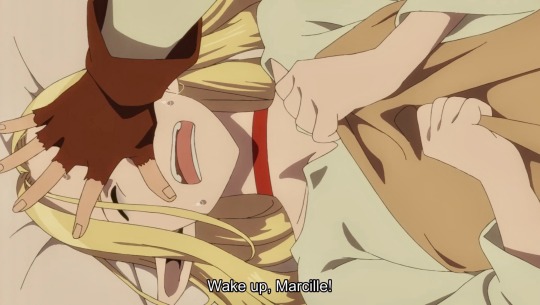
Laios has to quickly stop him, explaining that he could truly hurt her if he interrupts the attack this way. He tells them how he’s going to wake her, and he doesn’t hesitate. He jumps straight in, explaining what he’s doing for the others so that they (Chilchuck) won’t be afraid.
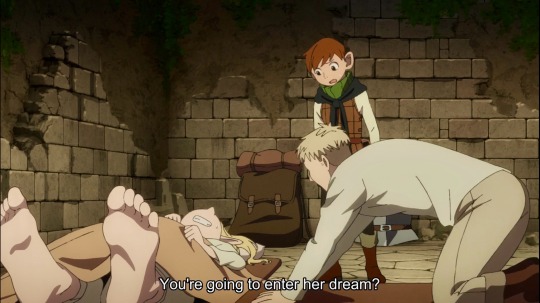
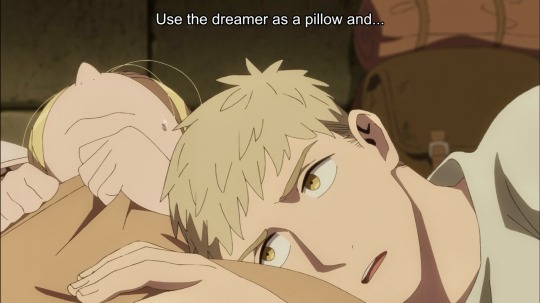
Chilchuck doesn’t question him once. He just does what he can to hurry along the process. He tucks Laios in with his blanket as soon as he lays onto Marcille—an unnecessary action that betrays how much he cares for both of them.
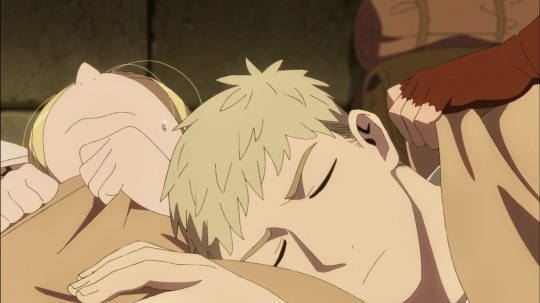
And Laios succeeds in helping Marcille out of the nightmare’s grasp. While trapped in her mind, he reassures her, protects her, tells her how much she’s valued and appreciated. He isn’t embarrassed or sheepish about it, either; he openly declares these things like it’s the most normal and obvious thing in the world.
He gets her out, he saves her. He did the exact thing he set out to do, even though he’d never done it before, and only had Falin’s secondhand information to work with.
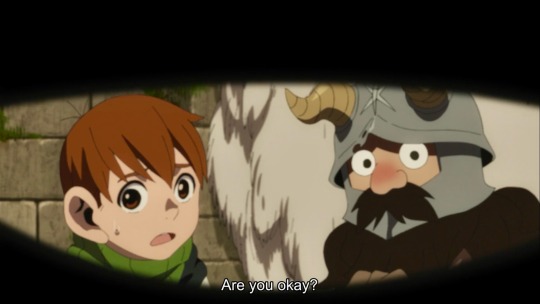
Once he wakes, Chilchuck immediately checks on him to see if he’s alright. Chilchuck is clearly still rattled, displeased with having to wait while both of his close friends were unconscious, fighting a battle neither he nor Senshi could see or help with.
Marcille wakes up shortly after Laios, but Chilchuck is still on edge, worrying that she’ll fall back asleep. Laios, too, has a moment of alarm when he makes sure she won’t close her eyes again.
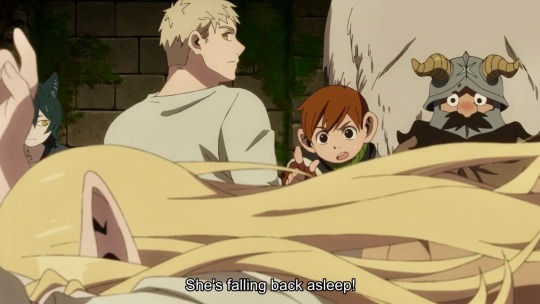
Once he takes the subdued nightmares out of Marcille’s pillow, only then do Laios and Chilchuck relax.
Laios, for his part, remained calm and collected almost the entire time. He did not show panic or fear when it became clear that Marcille was being attacked, nor when he told the rest of the party what he’d be doing to help her. And once the nightmares had been collected from her bedroll, he gently explained what happened, to everyone else’s horror.
Seeing this, it’s not a huge surprise that the Touden party is so successful. We’ve seen Laios handle danger with a level head; we know he’s capable.
But it’s an entirely different kind of talent to face a threat that’s targeting one of your closest friends—which can make even the most competent fighter sloppy out of fear of losing them—one that requires a high-risk, specific rescue style that none of you have ever tried before. And then pull it off flawlessly. Like damn, these guys are lucky to have him.
#i will never be normal about the interpersonal relationships of the touden party#dungeon meshi#delicious in dungeon#marcille donato#laios touden#chilchuck tims#senshi#izutsumi#senshi of izganda#dungeon meshi spoilers#dunmeshi#dunmesh spoilers#dungeon meshi analysis#dungeon meshi meta#chilchuck dungeon meshi#laios dungeon meshi#marcille dungeon meshi#you know i’m not above viewing this in a shippy light. but i love both platonic & romantic iterations so i’m happy either way#laimar#marchil#marchilaios#laimarchil#i’m just guessing on ship names at this point lmao
2K notes
·
View notes
Text
Grian sits on the edge of a desert cliff, watching the sunrise. His knuckles are bloody. He's had this dream before, and he's lived this moment before. He's awfully tired of it, honestly. He's not even particularly sad anymore. It's hard to be particularly sad, this long after, this much more between them.
But his knuckles are bloody again. There's someone sitting next to him.
"Joel?" he says, baffled.
"Yeah, hi, really weird bloody dreamscape you've got. Literally and figuratively: bloody hell. Like, Scott, he's got this pretty cottage and all these flowers and the single most terrifying version of Jimmy that I've seen in my life. Which serves him right, since he's a bastard, and I told him that. Or, uh, Pearl. She's normal. She's got dogs and... shit, I don't know--"
"Why are you here?" Grian asks.
"Oh, right, I was tasked with asking you if you regret it," Joel says.
There's a long moment of silence. The wind blows.
"I mean. No?" Grian says.
"Right? That's what I said! Blumin' stupid question, that!" Joel says.
"Wait, you mentioned--are you asking everyone that?" Grian asks.
"Yeah! It was all, oh, you've got a car, you can travel, it'll be all poetic like. You've had a 'character arc'--like I'm some, some fake guy--and grown as a person, everyone else has to, would they do things differently now? And I said, man, that's stupid. That's really stupid. But the glowing purple eyes guys--"
"Wait wait wait wait, the who?" Grian interrupts.
"Sorry, do you not know the glowing purple eyes guys? Martyn was acting like you're all buddies or something. Then I punched him. Because it was funny," Joel says.
"No, I know the--they asked you to do this?" Grian says. He takes a moment to try to imagine it. He has some trouble. Joel and the Watchers don't really belong in the same place at the same time for so many reasons that Grian doesn't know where to begin.
"Apparently, I'm not being serious enough," Joel informs Grian. "I kinda get it, actually. Like, everyone but Cleo has been somewhere like..."
Joel looks out over the cliff. It is tall, and Grian knows he cannot see the ground from the top. He had been able to during the actual games, of course, but these aren't the actual games; these are the memories of what brought him to victory, made manifest.
"So I guess I kinda wondered, since you lot always seem so blumin' sad about it," Joel finishes.
"I'm not really," Grian says.
Joel raises an eyebrow.
"I mean, maybe once, but--nah. Not really."
"Cool. That's the last one then," Joel says. "Hear that, weird glowing eyes guys? You act like I'm all weird or whatever but none of them regret it either. Not a single one of them."
Grian looks over the cliff again himself.
"None of us?" he asks, very quietly indeed.
Joel sighs. "All of you asked that too. I'm getting back in the bloody car."
Grian doesn't watch Joel leave. He rubs the blood off his knuckles and watches the sky instead. When he's tired thinking in circles about how he didn't really expect that he would be telling the truth, just then, he starts trying to imagine the trouble Joel might be giving everyone else instead. It's much more fun to think about than the sand that's getting in his socks. He's never able to get sand out of anything, these days, and it leaves him always just a little bit uncomfortable. Oh well; the price of being in a desert. He wouldn't be anywhere else if he had the choice, though, grit in his socks or not.
#trafficblr#a bee fic#trafficfic#joel smallishbeans#grian#i... don't know this one went like three different directions#take it. it's sort of character analysis sort of just me being me.#I'M IN A FICLET MOOD I GUESS.
788 notes
·
View notes
Text
Part of Robby already knew.
This wasn’t a jump decision to immediately believe Santos over Langdon. It was confirmation of what he had already suspected. As soon as he saw that vial, he knew it was Langdon.
Robby has been working in the ED for twenty years – he knows when someone is abusing drugs, he knows what an addict looks like.
But Langdon was supposed to be his mentee. He wanted to mold Frank like Adamson molded him.
So, he looked past the signs - the irritability, the impulsiveness, the troubles at home. He looked past the paranoia and anxiety. Even didn’t connect the outburst at Santos being a sign he was high.
He saw an incredible emergency doctor at the top of his game and refused to believe that he could be operating at such a high level of competency while under the influence.
Because admitting Langdon was an addict meant admitting that he let it all pass. This is why he’s already broken up before he even says anything to Langdon. He knew he would find those pills in his locker. He knew that Langdon would immediately go into defense mode and try to brush him off. Before a single word was exchanged, he knew.
The disappointment was in himself just as much as it was in Langdon. He let it get this bad. He let it happen.
#the Pitt#the pitt spoilers#the Pitt 1x10#frank langdon#michael robinavitch#tw addiction#my content#sort of I guess - the content is the analysis lol
809 notes
·
View notes
Text
it is completely understandable to be uncomfortable with the sexual assault in dandadan. it's important to discuss how it's framed, whether it's handled poorly, or if it could be been portrayed better. but the number of people - even fans - stating that it is only fanservice, irrelevant, or could be removed is frankly bizarre to for SO many reasons, starting with the fact that this parallel exists.
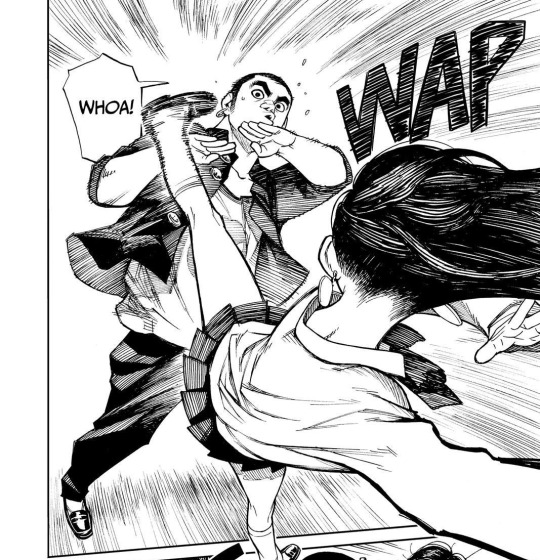
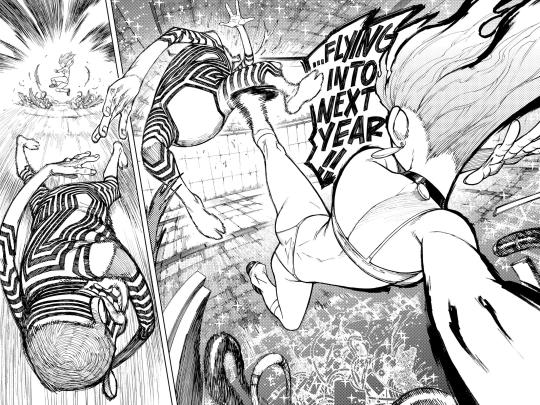
the anime made it even more obvious by interpolating cuts from the first scene into the second one.


i thought this scene showed that momo gaining her powers by believing in her relationship with her grandmother gives her the strength to fight back against what is basically a horrific, much more aggressive and abstract (maybe even absurd?) representation of her shitty gross ex - who was demanding she 'put out' and pay for the love hotel in very first scene.
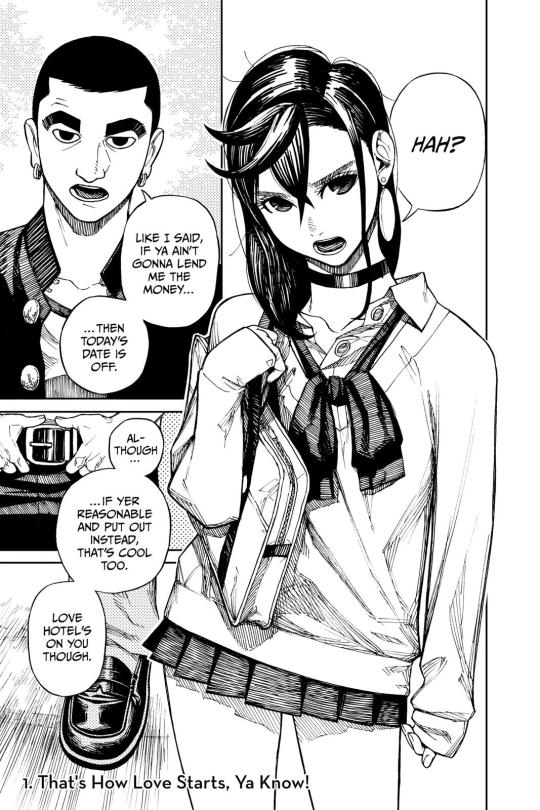
while the escalation from one scene to the next is surprising, it's not something that comes out of nowhere. this first scene is meant to be a set-up to what will happen later. it sets the tone, though significantly more lighthearted at this point. it tells you that sex, sexuality, etc. is something dandadan will touch on - though you don't know what the scope and depth will be until later in the chapter.
i cannot recommend this video enough, as it discusses some interesting interpretations of what the serpoians and turbo granny represent in their respective assault scenes, as well as how right now the treatment of both scenes is unfortunately uneven.
more notes about plot and thematic relevance below the cut. spoilers for anime-onlies (up to chapter 8, will probably be covered in episodes 4/5).

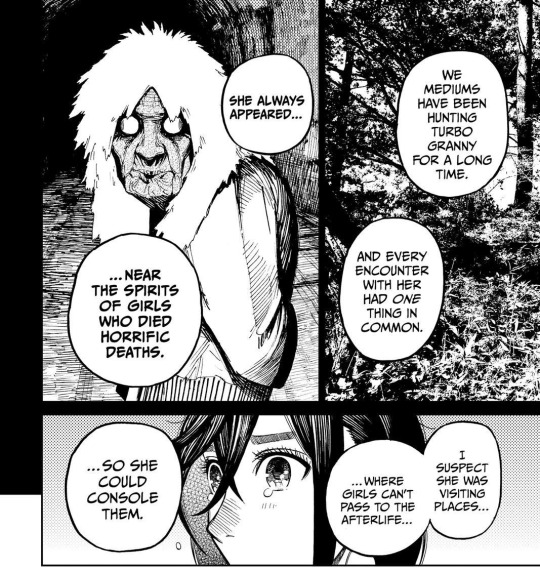
momo was assaulted, and almost cut up by the serpoians, much like the other victims turbo granny appeared around. this is an intentional parallel. turbo granny goes to momo because that is what she does. again, SUPER unclear how that factors into turbo granny's assault of ken, but if we keep the video's interpretation of cynicism in mind, it could be related to that; maybe turbo granny has a cynicism toward men - similar to momo in chapter/episode 1 - and this is why she chose to attack ken. unfortunately, it's still too early to really understand and explain a lot of her motivations.
again, completely understandable to not like how the sexual assault was handled or portrayed, and it's important to keep discussing it. but this is what dandadan does for many different types of trauma and difficult life experiences. this is a huge part of dandadan's identity. if you don't like it, that is fine, but calling the sexual assault 'just fan service' is blatantly untrue.
#dandadan#L.txt#long post#dandadan analysis#< i guess? 😭#discussdadan#sorry for this kinda sloppy post but i need it out bc i feel like im losing my mind#this is not even ''''''''''a defense''''''''''' of the s/a i think it's really important to discuss framing/handling/etc etc#but some of the discourse arising from the first episode is maddening and is thoroughly not helped by ppl being weird/assholes abt it#you dont ''''''have to like it'''''' (< what does that even mean??) or keep reading it or literally anything#this is just a basic 'please engage w the text'
1K notes
·
View notes
Text
My hot take on Charles is that he just cannot for the life of him distinguish between platonic and romantic feelings. It makes sense considering that his friends literally murdered him and that he's a bi kid from the time of the AIDS crisis, but telling Edwin that he likes the girl he's been making kissy-face at because she reminds him of Edwin was bonkers.
I don't really see Charles as having any degree of romantic feelings for Crystal. She's there; she's beautiful; she can see him; she's alive. And she's a pretty girl that he has things in common with, and he likes her! Of course those things go together romantically! Logical conclusions, aren't they?
With Edwin, it's a little different. He can't say he's in love with him, but he's constantly checking him out. He does so as early as the first episode when Edwin takes off his jacket in Esther's house. This persists through the 6th episode when he runs his eyes up and down Edwin in his nice outfit. More than that, Charles wants to share everything with Edwin, has been living with him for 35 years, went to literal Hell for him, and has the primary motivation of not being split up from Edwin. The hand-over-the-heart at the end of the season may be his epiphany - but we'll never know.
Charles literally just never considered whether he might be queer because, hey, he likes girls! And, yeah, he's still got it because he can (badly) flirt with a living girl 'his age!' But boys? Edwin? Nah, they're just best mates. Which is so much more to him than dating or whatever, because it's Edwin.
He drives me crazy and I love him so much.
#anti cryland#i guess? not really? it's more an analysis#of the canon#charles rowland#dbda#dead boy detectives
304 notes
·
View notes
Text
AO3 is now making people agree to a privacy policy before being able to access their content. What does that mean?

This is not something to be scared of. Knowledge is power so I encourage you to do research, especially if you're concerned about your privacy as a reader or writer on AO3. Please do your own research and come to your own conclusions. I can only provide the information, and I also do not have a law degree so I am not the person to speak to about this lol
Here are some relevant links, information, and full screenshots of that privacy policy that hopefully can help explain what it is and what you're agreeing to:
"Any Personal Information you include in your Content (including Special Categories of Personal Data and other types of Personal Information) may be accessible by AO3 administrators. It may also be accessible by the general public if the Content is made public, or by AO3 users if the Content is made available to AO3 users."
Definition of, ‘Processing of special categories of personal data’.
(we won't share your information at all unless one of these very specific and probably legal situations happens)
---
"You may have other rights regarding your Personal Information under the laws of the jurisdiction in which you are located. We will not discriminate against you for making a request under the data privacy laws of applicable jurisdiction."
Link to rights under data privacy laws in the UK, EU, and some US states. (I encourage you to also do your own research for your country/state)
---
"We will not share your Personal Information with any third parties without your prior consent, except for the following cases:
For external processing: We may use third-party services to store, process, or transmit data, or to perform other technical functions related to operating AO3. For example, we may use third-party email services. A list of third-party services is provided in our Subprocessor List. We cannot guarantee other services' technical performance. We or the services we use may store or process your Personal Information in data centers which may be located in the United States or elsewhere."
Link to what subprocessors are and what that means. (Again I encourage you to do your own research.)
---
This has no links but it is just helpful to know.
"For legal reasons: We may share Personal Information if we:
are legally compelled to do so;
have a good-faith belief that such action is necessary to comply with a current judicial proceeding, court order, or legal process served on the OTW; or
are cooperating with law enforcement authorities. We will cooperate with all investigations conducted by law enforcement authorities within the United States when legally required to do so. Cooperation with law enforcement authorities from other countries and cooperation when it is not legally required are at our sole discretion. Our discretion looks favorably on freedom and justice, and unfavorably on oppression and violence.We will attempt to notify you any time we disclose your Personal Information to a third party for legal reasons, unless legally prohibited from doing so or if, in our sole judgment, notification might hinder an ongoing investigation. In some cases, the Personal Information we have, such as an IP address, may be insufficient for us to notify you."
---
"If you have any questions, concerns, or complaints about this Privacy Policy, or would like to submit a data request, please contact the Policy & Abuse committee."
Link to the Ao3 Policy & Abuse Committee
---
Final links that I believe could be of benefit:
Which AO3 features collect, process, retain, and/or display my content or personal information, and how do they use it?
The full AO3 Terms of Service
The AO3 Terms of Service, including the Content Policy and Privacy Policy, are licensed under the Creative Commons Attribution 4.0 International License.
The screenshots of the full Privacy Policy are below for those who want to read it.




After reading it I personally think it just means that legally they are now required to inform us that our information is being stored in 3rd party sub-processors (because they’ve gotten so big) and how our information is being stored therefore having to explain how and when it would be used if at all. again this is just my personal opinion from reading the information.
#ao3#archive of our own#analysis i guess?#information dump#ao3 writer#ao3 fanfic#ao3feed#ao3 link#ao3 author#fanfic writing#privacy policy#staytrueblue analysis#staytrueblue
548 notes
·
View notes
